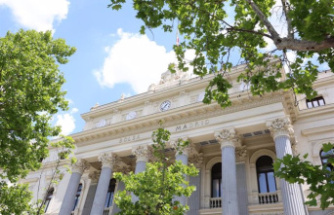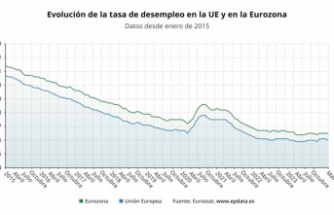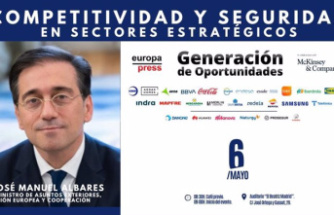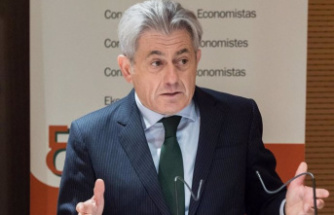MADRID, 18 Feb. (EUROPA PRESS) -
This coming Thursday, February 22, Repsol launches an update of its strategic plan to accelerate its transformation, once its previous 'roadmap' has been completed two years in advance, with the threat of investments in Spain in the air.
If the 2016-2020 plan was the 'Value and Resilience' plan due to the moment the company was experiencing with falling oil prices, and the 2021-2025 plan, in the midst of Covid-19, was the 'Growth and Valor', now the energy company is preparing to open a new stage backed by the strength that has given it a favorable wind in the price environment and refining margins.
In recent years, the company led by Josu Jon Imaz has focused its transformation objective towards multi-energy and the path of decarbonization, to accelerate towards that goal of being zero net emissions in 2050.
In this sense, Joaquín Robles, an analyst at renewables to have less dependence on traditional energy sources and reinforce its multi-energy profile".
For his part, in a recent report on the company, Pablo Fernández, Renta 4 analyst, also supported a new "continuous" Repsol plan.
Thus, the improvement in the efficiency and sustainability of its 'upstream' (exploration and production) and industrial businesses will once again be present as a sign of the group's identity for the coming years.
Another focus will be how the investment effort is increased, which in the current one has already been boosted to 19.3 billion euros - from the 18.3 billion euros planned for 2021-2025 -, of which 6.5 billion is destined for low initiatives in carbon.
In the first nine months of 2023, Repsol has already increased its investments to 4,362 million euros - with more than a third of them allocated to its Low Emissions business -, focused on Spain and the United States.
In addition, it will mark new steps of growth in its 'Low Carbon' business, with its mind set on continuing to increase renewable projects and promoting biofuels, one of the company's great bets to contribute to the decarbonization of the economy.
On this path of 'green' energies, the company has also taken decisive steps in its internationalization in recent times, with an important focus on the United States, where it entered in 2021 with the purchase of 40% of Hecate Energy, specialized in the development of photovoltaic solar projects and batteries for energy storage, and landed last year in the onshore wind business in the country with the acquisition of ConnectGen - with a project portfolio of 20,000 MW of onshore wind, solar and energy storage. energy in the country -, in its largest operation in renewables.
The ambition of the energy company chaired by Antonio Brufau in the North American country is to have an installed capacity of 2,000 MW in 2025 and 8,000 MW in 2030.
This strategy of building a geographically diversified renewable business in Spain, Italy, Chile, Portugal and the United States also includes acquisitions such as that of Asterion Energies, with a portfolio of 7,000 MW of 'green' assets.
And renewable generation is one of the main pillars of Repsol's energy transition, with an ambition in its current plan to reach 6,000 MW of 'green' installed capacity in 2025 and 20,000 MW in 2030.
To boost growth in this area, Repsol has relied on important alliances, among which the association with Credit Agricole Assurances and EIP stands out, an operation that valued the renewable business at 4.3 billion euros in 2022, and the incorporation of partners such as Pontegadea and The Renewables Infrastructure Group (TRIG) in solar and wind assets.
In this line of transformation, it will continue to continue what its entry into the electricity business entailed with the purchase of Viesgo assets in 2018 to consolidate itself as a relevant player. The purchase of marketing companies, the last of them with CHC Energía, has helped the group raise its portfolio of electricity and gas customers to over two million, advancing in two years the achievement of the objective set in its plan for 2025 and consolidating itself as the fourth market operator in Spain in number of electricity clients.
However, this new plan will also serve to find out if the group remains with its swords raised in its fight with the Government in the face of the threat of relocating large projects if the extraordinary tax on energy companies is maintained, which led to the company to put on 'stand by' some of its initiatives to promote hydrogen.
Repsol has not hesitated to raise its voice on several occasions in response to the decision of PSOE and Sumar to maintain this tax on the sector, asking for a stable and predictable regulatory framework to be able to face the investment effort for its projects.
Along the way, the Government has assured that the future General State Budget Law (PGE) for 2024 will include an incentive for strategic investments that are essential for the ecological transition.
Regarding the remuneration of its shareholders, once the goals set in the current plan have also been pulverized, Banco Sabadell analysts, in a recent report, trusted that more visibility will be given, after the improvement of the interim dividend. 2023 announced in October - up to 0.40 euros per share compared to the previous 0.375 euros.
In this regard, they considered that it could imply raising the dividend to 0.80 euros per share - 14% more compared to 2023 -, taking into account that the complementary dividend to be paid in July has historically never been lower than that of a account. Adding dividends and capital reductions, it reaches 2.4 billion euros in 2023 as a whole.













